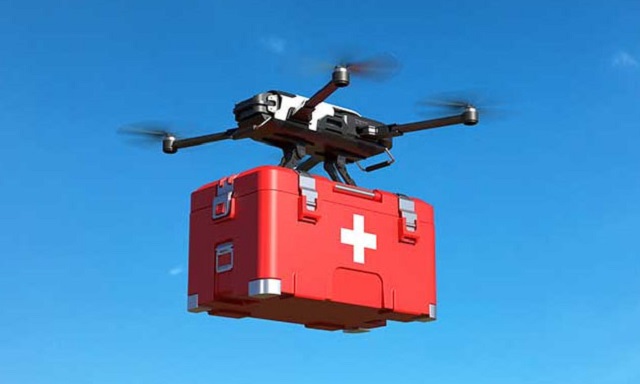
African-led health tech has improved the lives of millions of patients. But systemic change in global health procurement is needed to support local innovations
ANALYSIS | AGENCIES | In a remote village in Rwanda, a life-saving medicine delivery takes place. A drone, operated by Zipline; an American company that designs, manufactures, and operates delivery drones, navigates the skies, carrying vital medical supplies to a health centre inaccessible by road. This scene, once a distant dream, is now a daily reality, thanks to African-led health tech innovations.
Zipline’s drone delivery service has transformed healthcare in Rwanda, ensuring timely access to essential medicines and vaccines and has delivered over 10 million health products and 15 million vaccine doses.
In Nigeria, Shelf Life, an inventory management and financing service from Field Intelligence, has transformed inventory management for community pharmacies. This service allows local pharmacies to maintain a diverse stock of genuine medicines affordably, crucial in a market where falsified drugs are rampant.
Community pharmacies, often the first point of care in low- and middle-income countries, usually have poor access to finance from traditional institutions. They resort to stocking only fast-moving drugs like antimalarials and antibiotics, leaving patients needing more specific treatments underserved. Shelf Life solves this by providing access to credit and genuine medications, ensuring pharmacies offer a wide range of essential medicines. So far, they have helped over 3,200 pharmacies in Nigeria and Kenya, directly improving the health outcomes of over 1.5 million patients.
Consider the potential of scaling such innovations across Africa. Governments, donors, and health industry leaders must engage with these home-grown solutions to make health systems work effectively. Embracing innovation, taking risks, and collaborating with health innovators makes economic sense. The alternative – maintaining the status quo by relying on traditional methods – is riskier. African health tech innovators have already proven their resilience, efficiency, and sustainability.
Large purchasers who fund health in Africa, such as donors, governments, and big pharma, often overlook local tech-enabled innovations and fail to see their potential in solving health system challenges. This oversight results in missed opportunities to leverage local innovations, which offer contextual relevance and sustainable impact. Local innovators understand the specific needs and challenges within African communities and are developing tailored solutions more likely to succeed in these contexts.
To foster a more inclusive and effective health ecosystem, these large purchasers must adapt their strategies to support local innovators. Public-private partnerships (PPPs) can play a vital role. For instance, the Investing in Innovation (i3) Africa programme has successfully connected African health tech startups with funding and strategic partnerships. Launched by Salient Advisory and partners, i3 aims to democratize access to grant funding and facilitate connections between African startups and global customers.
In just two years, i3 has provided 60 promising African health tech startups with $50K grants each and linked them to numerous local and international customers. This programme has catalyzed over 70 partnerships, created more than 700 jobs, and impacted around 190 million patient visits annually. By supporting models like this, stakeholders can foster environments where local innovations thrive and improve health outcomes.
To truly advance local health tech solutions and drive sustainable health impact, stakeholders must take decisive action:
* Invest in tech-driven service delivery: Early impact data from Zipline and Field Inc shows that doing so can help large health purchasers achieve more with fewer dollars. This includes adopting digital health platforms, telemedicine, EMR solutions, AI-powered diagnostic tools, and more, that enhance healthcare delivery and accessibility across the continent.
* Set clear procurement targets: Donors, governments, and industry players should commit to allocating a specific percentage of their health budgets in Africa to African innovations. This will promote local innovators and ensure their contextually relevant solutions receive the support needed to scale.
* Foster inclusive PPPs: Support, replicate, and scale successful PPP models like i3 Africa, which have proven effective in connecting local innovators with essential resources, partnerships, and customers.
* Prioritise learning and evidence generation: What models work has yet to be fully discovered. Focus on gathering data on health tech solutions’ effectiveness, efficiency, and cost-effectiveness. This information is crucial for quickly adapting and scaling impactful innovations.
* Provide support via grants or other funding mechanisms: Encourage successful founders (health tech and non-health tech) to provide support and mentorship to the next cohort of founders or use their expertise to tackle the biggest health challenges on the continent.
* Prioritize women-led innovations: Governments and ecosystem players should actively seek out and support women-led health tech startups, which are often overlooked. Targeted funding and opportunities to empower them are necessary.
By recognising and investing in the remarkable potential of African health tech innovators, the global health community can create a more inclusive, effective, and sustainable health ecosystem. One that addresses the pressing health challenges of today and in the future. Now is the time to invest in African-led innovation.
 The Independent Uganda: You get the Truth we Pay the Price
The Independent Uganda: You get the Truth we Pay the Price



